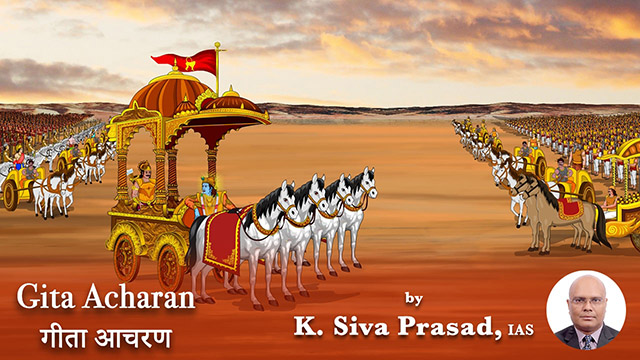
Understanding 𝙫𝙖𝙧𝙣𝙖𝙨 (divisions) as well as 𝙠𝙖𝙧𝙢𝙖𝙨 (actions) performed by them based on the 𝙜𝙪𝙣𝙖𝙨 springing from their nature is one of the most challenging facets of the Bhagavad Gita. The difficulty is compounded by the fact that we are deeply identified with one 𝙫𝙖𝙧𝙣𝙖 or another of these 𝙫𝙖𝙧𝙣𝙖𝙨. The following verses clarify that the 𝙫𝙖𝙧𝙣𝙖𝙨 are not hierarchical and the 𝙠𝙖𝙧𝙢𝙖𝙨 performed by anyone have equal potential to attain 𝙨𝙞𝙙𝙙𝙝𝙞 (perfection or freedom).
Krishna says, "With devotion to 𝙨𝙬𝙖-𝙠𝙖𝙧𝙢𝙖 (one's deed or duty) one attains 𝙨𝙞𝙙𝙙𝙝𝙞 as this devotion is nothing but worshipping HIM from whom all beings rise and by whom all this is pervaded" (18.45-18.46). Krishna earlier used 𝙨𝙬𝙖-𝙙𝙝𝙖𝙧𝙢𝙖 (own nature) and now uses 𝙨𝙬𝙖-𝙠𝙖𝙧𝙢𝙖. Essentially, 𝙨𝙬𝙖-𝙠𝙖𝙧𝙢𝙖 emerges from hidden 𝙨𝙬𝙖-𝙙𝙝𝙖𝙧𝙢𝙖.
Firstly, in today's context, in almost all cultures and societies, some professions like sports, acting and singing receive more admiration than others. Similarly, in the olden days, the importance was based on some other factors. These verses clarify that by fulfilling their 𝙨𝙬𝙖-𝙠𝙖𝙧𝙢𝙖, born of their innate qualities, one can attain 𝙨𝙞𝙙𝙙𝙝𝙞. So doing our best in anything we do is what matters irrespective of what we do.
Secondly, our divisive mind is trained to build hierarchies and these verses dispel the false notion that the 𝙫𝙖𝙧𝙣𝙖𝙨 are hierarchical. Krishna clarifies that there are no hierarchies in 𝙠𝙖𝙧𝙢𝙖𝙨 and by just performing 𝙨𝙬𝙖-𝙠𝙖𝙧𝙢𝙖 arising according to the 𝙜𝙪𝙣𝙖𝙨 springing from our nature, we can attain 𝙨𝙞𝙙𝙙𝙝𝙞.
Thirdly, Krishna earlier advised the wise men to not unsettle the ignorant, who are attached to actions (3.26). The aforementioned verses give the reason for this advice as one can attain the 𝙨𝙞𝙙𝙙𝙝𝙞 through their actions emanating from their 𝙜𝙪𝙣𝙖𝙨. Hence, someone who attained 𝙨𝙞𝙙𝙙𝙝𝙞 through one path shouldn't belittle other paths.
https://epaper.dailyworld.in/Details.aspx?id=157505&boxid=78189&uid=&dat=2024-11-10

